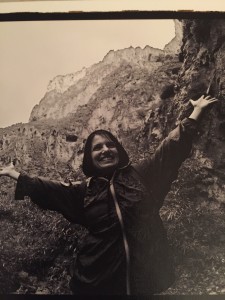 Do you have regrets? Most of us do.
Do you have regrets? Most of us do.
What function does regret serve?
How can we live more freely and release the pain of the missed opportunities of the past?
When I was growing up, the quote “I woulda, coulda, shoulda, but I didn’t” was on my family’s bathroom wall (and is still posted there today). As a young child, I remember reading this quote and understanding that we don’t always get do-overs. Yet, knowing this from an early age didn’t stop me from doing things that I would later regret and then carrying those regrets with me into my life.
Doing things that we aren’t happy about after-the-fact is part of being human. Holding onto those things is also often a part of the human experience, but does it have to be? I would suggest that with commitment and focused healing action, we can train ourselves to let go of these heavy burdens, stop them from weighing us down, and move ourselves continually toward radical self-acceptance.
Let’s take a closer look…
Regret defined: Feeling sad, repentant, or disappointed over (something that has happened or been done, especially a loss or missed opportunity).
Function of Regret: We, as humans, desperately want to avoid making the same mistake twice. We have been taught that we must learn from our mistakes, and when we don’t “learn our lesson,” we often feel stupid, angry, frustrated or any number of other not-so-feel-good-feelings. Thus, we punish ourselves. We relive the mistake over and over, self-deprecating, reminding us of the pain we felt when we first made the mistake (and perhaps reliving the pain we may have caused someone else). We re-experience the loss of that missed opportunity almost like a death, and we spend weeks, months, even years grieving that loss, sometimes in a self-destructive manner.
Pain of Regret: This repetitive “lesson” (also a form of self-harm) then becomes etched in our brain’s neural pathways and into our physical bodies. Our brains learn from repetition. This loop of regret causes the synapses to fire together and wire together, becoming more reinforced with each repetition. The regret loop also takes a toll on our bodies. It is said that “the issues are in the tissues.” Humans do a great job of storing pain in secret hiding places in their bodies, only to be discovered in forms of distress and disease over time.
Releasing Regret: Awareness and a commitment to healing is necessary to work through regret. You have suffered a loss. It has been burdening you mentally, emotionally, and physically. You’ll need to be willing to connect with some of that pain and grief in order to let go of it. This also takes courage. It isn’t easy to face your pain and deal with it directly. The other must-have ingredient is compassion. You have spent a lot of time being angry and/or sad (and having many other feelings) about the regrets you have been holding onto.
An Exercise in Letting Go: See what it’s like to close your eyes and see the person you were in the moment that you regret most. Imagine the setting and the experience…sights, sounds, smells, and sensations. The more you visualize the specifics, the more powerful the experience. Once you are back there, locate a place inside of you that is the most loving, wise part of yourself. Breathe a few deep breaths into that space. Experience the loving part of you filling up your whole being. See what the loving part of you might have to say to the part of you that made the mistake. Let your loving, compassionate self speak to the part of you that has been in grief and regret. When the loving part of you has completed saying its piece, use the creativity of your mind to envision your most loving self reaching out and giving the regretful part a big, warm hug. Take a few breaths and notice what you’re feeling. Notice sensations and/or emotions. When that feels complete, you can open your eyes.
This exercise may sound a little “woo-woo” but what arises when you allow yourself to be fully immersed in it might surprise you! You’ll never know if you don’t try…(shoulda, coulda, woulda…).
Of course, there are no quick fixes to deep pain, so take this exercise as one loving way to begin the healing process and to begin releasing the burden of regret and take a step toward freedom. If for no other reason than taking care your mental health and physical well-being, start the healing process NOW.
Healing takes time. This is one step toward freedom.





